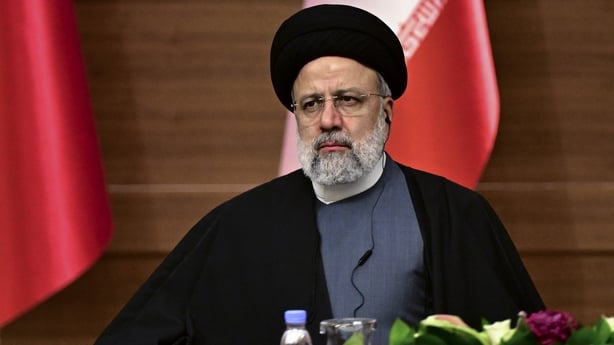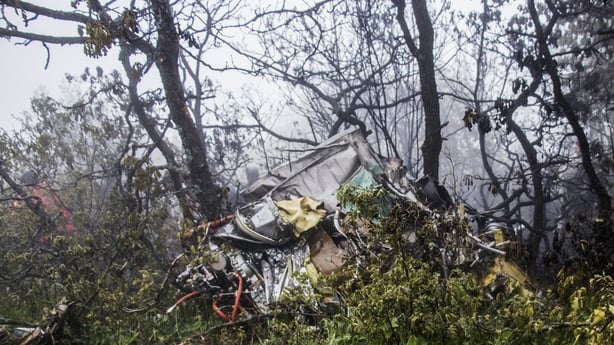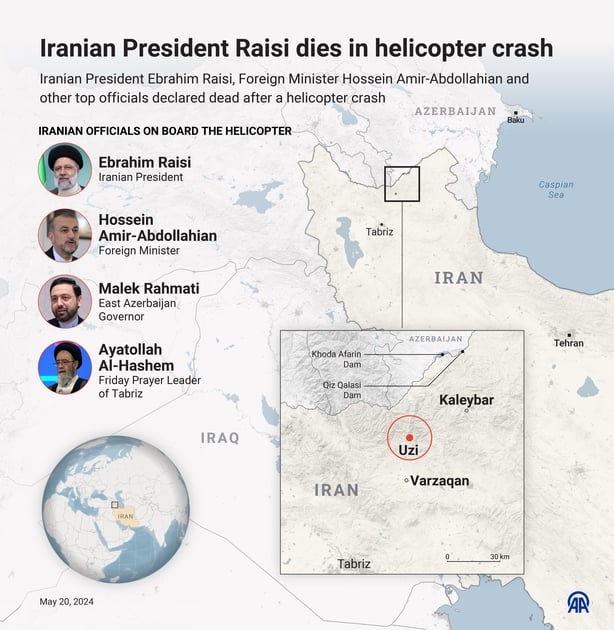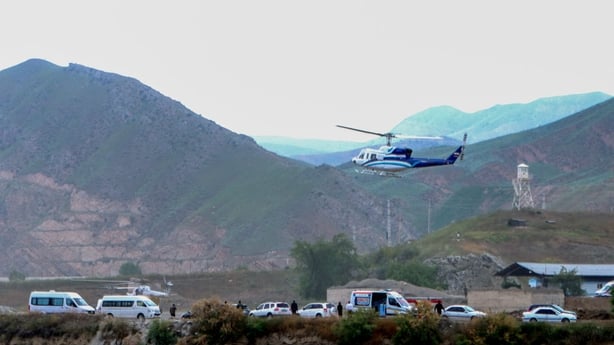Iranians are mourning the death of the country's president Ebrahim Raisi, who was killed after his helicopter crashed into a fog-shrouded mountain, setting off a period of political uncertainty in the Islamic republic.
Mr Raisi, 63, his foreign minister and seven others died when the aircraft went down yesterday in a remote area of northwestern Iran, where the wreckage was only found this morning.
The ultraconservative Raisi had been in office since 2021, a turbulent time during which Iran was rocked by mass protests, economic crisis deepened by US sanctions, and armed exchanges with arch enemy Israel.
Supreme leader Ayatollah Ali Khamenei, who wields ultimate power in Iran, declared five days of mourning and said vice president Mohammad Mokhber, 68, would assume interim presidential duties until elections are held within 50 days.
"The Iranian nation has lost a sincere and valuable servant," said 85-year-old Khamenei, whom Mr Raisi had been expected to one day succeed by many observers.

Thousands of mourners massed in central Tehran's Valiasr Square to pay their respects to Mr Raisi as well as to Iranian foreign minister Hossein Amir-Abdollahian.
Funeral rites are set to start tomorrow in Tabriz, East Azerbaijan province, for them and the other victims - three crew, two bodyguards, an imam and a provincial governor - before Mr Raisi's body was to be taken to Tehran.
Iranian authorities said the funeral procession for Mr Raisii and other members of his entourage would be held in Tehran on Wednesday.
Iran's military chief of staff Mohammad Bagheri ordered "a high-ranking committee to launch an investigation into the cause of the president's helicopter crash".
Iranian State TV broke the news earlier that "the servant of the Iranian nation, Ayatollah Ebrahim Raisi, has achieved the highest level of martyrdom", showing pictures of him as a voice recited the Koran.
Flags soon flew at half-mast and a black banner was hoisted at a major Shiite shrine in city of Qom south of Tehran.

Global allies Russia and China and regional powers voiced their condolences, as did NATO, while the UN Security Council observed a minute of silence.
Condolences also came from Palestinian group Hamas, Lebanon's Hezbollah and from Syria, all members of the so-called Axis of Resistance against Israel and its allies, amid high tensions over the Gaza war.
The United States offered condolences and said it saw no immediate security impact from Mr Raisi's death.
US Defense Secretary Lloyd Austin pre-emptively denied any US role in the crash and said there was no reason to think it was anything other than an accident.
Election within 50 days
Under the Islamic Republic's constitution, a new presidential election must be held within 50 days.
Any candidate must first be vetted by the Guardian Council, a hardline watchdog that has often disqualified even prominent conservative and moderate officials, meaning the overall thrust of Iranian policy would be unlikely to change.
Deputy Foreign Minister Ali Bagheri Kani was appointed as acting foreign minister following the death of Mr Amirabdollahian, IRNA said.
The crash comes at a time of growing dissent within Iran over an array of political, social and economic crises. Iran's clerical rulers face international pressure over Tehran's disputed nuclear programme and its deepening military ties with Russia during the war in Ukraine.

Since Iran's ally Hamas attacked Israel on 7 October, provoking Israel's assault on Gaza, conflagrations involving Iran-aligned groups have erupted throughout the Middle East.
A long "shadow war" between Iran and Israel broke into the open last month with tit-for-tat exchanges of drone and missile fire.
An Israeli official told Reuters it was not involved in the crash. "It wasn't us," said the official, who requested anonymity.
State media reported that images from the site showed the US-made Bell 212 helicopter slammed into a mountain peak, although there was no official word on the cause of the crash. The dead also included the governor of East Azerbaijan Province and a senior imam from Tabriz city.
Decades of sanctions have made it hard for Iran to obtain parts or upgrade its aircraft. Russia offered to assist Iran with investigating the crash.
We need your consent to load this rte-player contentWe use rte-player to manage extra content that can set cookies on your device and collect data about your activity. Please review their details and accept them to load the content.Manage Preferences
The helicopter went down in Varzeqan region north of Tabriz, state news agency IRNA reported, as Mr Raisi returned from an official visit to the border with Azerbaijan in Iran's northwest.
Mr Raisi, 63, was elected president in 2021, and since taking office has ordered a tightening of morality laws, overseen a bloody crackdown on anti-government protests and pushed hard in nuclear talks with world powers.
Messages of condolences poured in from Iran's regional neighbours and allies, including the leaders of Saudi Arabia, Syria, Egypt, the United Arab Emirates, Qatar, Jordan, Iraq and Pakistan.
Russian President Vladimir Putin called Mr Raisi "a true friend of Russia". The Kremlin said he had spoken to Mokhber by phone and both stressed "mutual intention to further strengthen Russian-Iranian interaction".
Indian Prime Minister Narendra Modi said he was "deeply shocked and saddened".
We need your consent to load this rte-player contentWe use rte-player to manage extra content that can set cookies on your device and collect data about your activity. Please review their details and accept them to load the content.Manage Preferences
There was less reaction from Western capitals, though the European Union and Japan expressed condolences.
Iran-backed militant group Hamas, fighting Israeli forces in Gaza with Tehran's support, issued a statement expressing sympathy to the Iranian people for "this immense loss."
Lebanon's Iran-backed Hezbollah group and the Houthi rebels in Yemen also issued statements praising Raisi and mourning his death.
Meanwhile, the exiled opposition group, the National Council of Resistance of Iran, described his death in a statement as a "monumental and irreparable strategic blow" to the Islamic Republic.

Rescue teams fought rain, blizzards and difficult terrain through the night to reach the wreckage in the early hours of this morning.
Earlier, the national broadcaster had stopped all regular programming to show prayers being held for Mr Raisi across the country.
Video showed a rescue team, wearing bright jackets and headtorches, huddled around a GPS device as they searched a pitch-black mountainside on foot.
In Iran's dual political system, split between the clerical establishment and the government, it is Mr Raisi's 85-year-oldmentor Khamenei, supreme leader since 1989, who holds decision-making power on all major policies.
Mr Raisi's victory in a closely managed election in 2021 brought all branches of power under the control of hardliners, after eight years when the presidency had been held by pragmatist Hassan Rouhani and a nuclear deal negotiated with powers including Washington.
However, Mr Raisi's standing may have been dented by widespread protests against clerical rule following the death of 22-year-old Kurdish woman Mahsa Amini in morality police custody, and a failure to turn around Iran's economy, hamstrung by Western sanctions.
Mr Raisi had been at the Azerbaijani border on Sunday to inaugurate the Qiz-Qalasi Dam, a joint project.
Azerbaijan's President Ilham Aliyev, who said he had bid a "friendly farewell" to Mr Raisi earlier in the day, had offered assistance in the rescue.
Read more: Raisi: hardliner on morality, protests and nuclear talks
